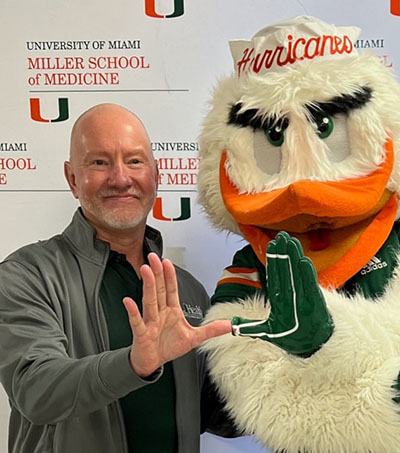
George Munson
Associate Professor, Microbiology and Immunology
Miller School of Medicine
gmunson@miami.edu
The Munson Lab focuses on two main research areas: the innate immune effector protein Perforin-2 and the modulation of bacterial pathogenicity by small molecules. Perforin-2, encoded by the Mpeg1 gene, is an evolutionary ancient gene present in taxa spanning from sponges and corals to humans. It is a crucial component of the innate immune system, limiting the spread and proliferation of bacterial pathogens. Research in the Munson Lab has shown that Perforin-2 forms pores in bacterial membranes, effectively killing a broad spectrum of bacteria, including gram-negative, gram-positive, and acid-fast bacteria. This protein is expressed by most eukaryotic cells, providing a frontline defense against pathogenic bacteria. Mice deficient in Perforin-2 are severely immunocompromised, highlighting its importance. In addition to uncovering the molecular mechanisms of Perforin-2’s bactericidal activity, the Munson Lab collaborates with clinicians to study patients with Mpeg1 mutations, which correlate with increased susceptibility to infectious diseases. Ongoing research aims to understand Perforin-2's activation, intracellular trafficking, pore-formation mechanisms, and interactions with other immune system components. The Munson Lab also investigates the modulation of bacterial pathogenicity. Diarrheal diseases are a major cause of morbidity and mortality with enterotoxigenic E. coli (ETEC) being a significant contributor. There are no vaccines for ETEC, and antimicrobial resistance limits treatment options. The Munson Lab, in collaboration with the Kull group at Dartmouth, discovered that medium chain fatty acids (MCFAs) inhibit ETEC pathogenicity by binding to its central virulence regulator, preventing the activation of essential virulence factors. This inhibitory mechanism is common across various enteric pathogens. The Lab aims to develop new pharmaceuticals to reduce the mortality and morbidity of diarrheal diseases.
Keywords: Perforin-2, bactericidal, immunocompromise, infectious disease, diarrheal disease, E. coli, antimicrobial resistance, pharmaceutical development




